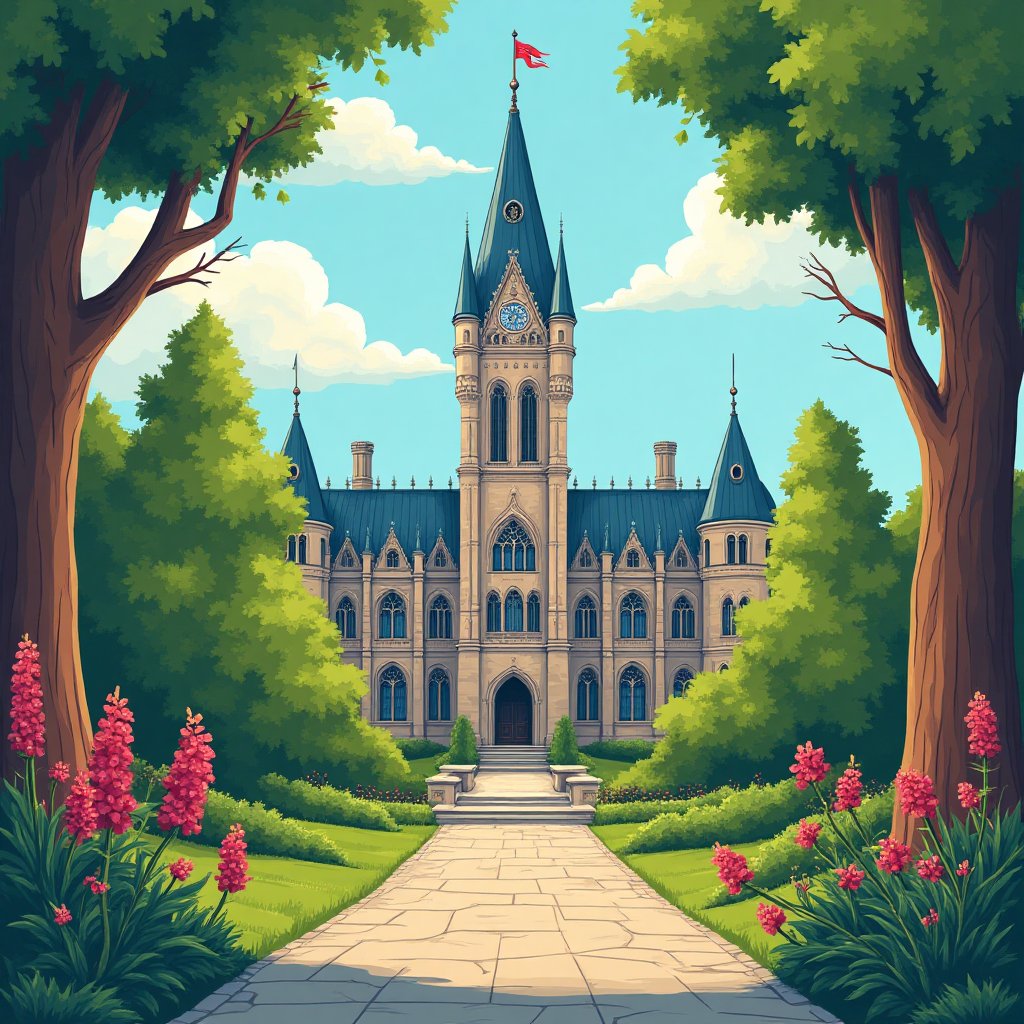What if a university could be more than just a place to earn a degree? What if it could be a launchpad for global leaders, a hub for groundbreaking research, and a melting pot of cultures and ideas? Welcome to the University of Ottawa (uOttawa), where academic excellence meets bilingual brilliance in the heart of Canada’s capital. Known for its unique blend of English and French education, uOttawa has become a magnet for students, researchers, and innovators from around the world. But what truly makes it famous? Is it the world-class programs, the cutting-edge research, or the commitment to social justice? Or is it the way it seamlessly blends tradition with innovation, creating a learning environment that’s as dynamic as it is inclusive?
Renowned authors and thinkers like Malcolm Gladwell, who explored the power of cultural diversity in his book Outliers, have highlighted the importance of unique educational environments. Similarly, Yuval Noah Harari, in his work 21 Lessons for the 21st Century, emphasizes the role of universities in shaping future leaders. And let’s not forget Canadian icon Margaret Atwood, whose advocacy for education and social justice aligns perfectly with uOttawa’s mission. These luminaries remind us that institutions like uOttawa are not just about academics—they’re about shaping the future.
For more local insights and news about Ottawa, visit Inthacity’s Ottawa Portal.
Bilingualism: A Unique Academic Experience
At uOttawa, bilingualism isn’t just a feature—it’s a way of life. As Canada’s largest bilingual university, uOttawa offers programs in both English and French, creating a learning environment that’s as diverse as it is dynamic. Imagine walking into a lecture where the professor seamlessly switches between languages, or collaborating on a group project with classmates from Quebec, France, and beyond. It’s not just about learning two languages; it’s about embracing two cultures, two perspectives, and two ways of thinking.
The university doesn’t just throw you into the deep end, though. It provides extensive language support, including courses, tutoring, and immersion programs, to ensure every student thrives. Whether you’re a native English speaker looking to master French or a Francophone polishing your English, uOttawa has your back. And let’s be honest, who wouldn’t want to impress their future boss with flawless bilingual skills during a job interview?
Speaking of jobs, bilingual graduates are in high demand, especially in Canada’s public and private sectors. From government roles in Ottawa’s Parliament Hill to international business opportunities, uOttawa’s bilingual graduates are equipped to navigate a globalized world. It’s no wonder that students from over 150 countries choose uOttawa—it’s not just a university; it’s a passport to the world.
For more local insights and news about Ottawa, visit Inthacity’s Ottawa Portal.
Academic Excellence and World-Class Programs
When it comes to academic excellence, the University of Ottawa doesn’t just talk the talk—it walks the walk. With a lineup of top-ranked faculties and innovative programs, uOttawa is a powerhouse of education and research. Whether you’re dreaming of becoming a lawyer, a doctor, or a business mogul, this university has the tools to turn your aspirations into reality.
Top-Ranked Faculties
uOttawa’s Faculty of Law is a crown jewel, consistently ranked among the best in Canada. It’s not just about memorizing case law here; it’s about shaping the future of justice. The Faculty of Medicine is another standout, producing healthcare professionals who are as compassionate as they are skilled. And let’s not forget the Telfer School of Management, where future CEOs and entrepreneurs learn to navigate the complex world of business.
Innovative Programs
uOttawa isn’t just about traditional programs; it’s about innovation. Take the Master of Public Administration, for example. This program is designed for those who want to make a real impact in public policy and governance. Then there’s the Bachelor of Health Sciences, which combines science and healthcare to address some of the most pressing health challenges of our time. These programs aren’t just about learning; they’re about doing.
Research Opportunities
At uOttawa, research isn’t just for professors; it’s for students too. The university offers access to state-of-the-art research facilities and opportunities to work with leading researchers. Whether you’re interested in artificial intelligence, environmental science, or social justice, there’s a research project waiting for you. And let’s be honest, who wouldn’t want to brag about working on groundbreaking research while still in school?
Research and Innovation: Driving Global Change
Research at the University of Ottawa isn’t just about publishing papers; it’s about making a difference. From health sciences to engineering, uOttawa’s research contributions are shaping the world we live in. And with a host of collaborative research centers, the university is a hub of innovation and discovery.
Cutting-Edge Research
uOttawa is a leader in research, with significant contributions in areas like health sciences, engineering, and social sciences. The university’s researchers are tackling some of the biggest challenges of our time, from climate change to public health. And with access to cutting-edge technology and funding, they’re making discoveries that are changing lives.
Collaborative Research Centers
The university is home to numerous research centers, including the Centre for Law, Technology, and Society and the Brain and Mind Research Institute. These centers bring together experts from different fields to tackle complex problems. It’s like a think tank, but with more coffee and fewer suits.
Impact on Society
uOttawa’s research isn’t just about academic accolades; it’s about real-world impact. The university’s work has led to groundbreaking discoveries and policies that address global challenges. From developing new medical treatments to shaping public policy, uOttawa’s research is making a difference. And in a world that’s constantly changing, that’s more important than ever.
Location: The Heart of Canada’s Capital
Nestled in the heart of Ottawa, the University of Ottawa (uOttawa) offers students a unique advantage: proximity to Canada’s political and cultural epicenter. This prime location isn’t just about convenience—it’s a gateway to unparalleled opportunities. Imagine stepping out of your lecture hall and walking a few blocks to Parliament Hill, where the nation’s most critical decisions are made. Or networking with industry leaders at one of the many multinational corporations headquartered in the city. Ottawa isn’t just a backdrop for uOttawa; it’s an integral part of the student experience.
For those interested in government and public policy, uOttawa’s location is a goldmine. The university is just minutes away from federal institutions like the Government of Canada, the Parliament of Canada, and numerous NGOs. This proximity opens doors to internships, co-op programs, and networking events that can kickstart a career in public service. But it’s not just about politics. Ottawa is also home to thriving tech and healthcare sectors, offering students diverse career paths.
Beyond professional opportunities, Ottawa’s cultural scene is a treasure trove for students. From the National Gallery of Canada to the Canadian Museum of History, the city is brimming with art, history, and innovation. Annual events like Ottawa Bluesfest and Winterlude add a vibrant, festive energy to student life. And let’s not forget the Rideau Canal, a UNESCO World Heritage Site, where students can skate in winter or stroll in summer.
Here’s a quick snapshot of what Ottawa offers uOttawa students:
- Government Access: Proximity to Parliament Hill and federal institutions.
- Career Opportunities: Internships and co-op programs in tech, healthcare, and public policy.
- Cultural Richness: Museums, festivals, and historical landmarks.
- Outdoor Activities: The Rideau Canal, Gatineau Park, and more.
For more local insights and news about Ottawa, visit Inthacity’s Ottawa Portal.
Commitment to Social Justice and Sustainability
The University of Ottawa isn’t just about academics and research—it’s a place where values matter. uOttawa has long been a champion of social justice, equity, and sustainability, embedding these principles into its mission and daily operations. From tackling systemic inequalities to leading the charge in environmental stewardship, the university is making a tangible impact both locally and globally.
One of uOttawa’s standout initiatives is the Human Rights Research and Education Centre, which focuses on advancing human rights through research, education, and advocacy. The center collaborates with organizations worldwide to address issues like gender equality, racial justice, and Indigenous rights. For students, this means opportunities to engage in meaningful projects that drive real change.
Sustainability is another cornerstone of uOttawa’s mission. The university’s Office of Campus Sustainability leads efforts to reduce the institution’s environmental footprint. From energy-efficient buildings to waste reduction programs, uOttawa is walking the talk. The university is also a proud participant in the United Nations Sustainable Development Goals (SDG) Initiative, aligning its research and operations with global sustainability targets.
Here’s how uOttawa is making a difference:
- Social Justice: Initiatives like the Human Rights Research and Education Centre.
- Sustainability: Energy-efficient buildings, waste reduction, and SDG alignment.
- Global Impact: Partnerships and projects addressing poverty, inequality, and climate change.
uOttawa’s commitment to these values isn’t just about policies—it’s about creating a community where everyone feels valued and empowered. Whether it’s through research, education, or campus initiatives, the university is proving that higher education can be a force for good.
For more local insights and news about Ottawa, visit Inthacity’s Ottawa Portal.
AI Solutions: How Could AI Enhance uOttawa’s Impact?
Artificial Intelligence (AI) is no longer a futuristic concept—it’s here, and it’s transforming industries, education, and research. For the University of Ottawa, AI presents an unprecedented opportunity to amplify its impact, innovate its operations, and lead in ethical AI development. Here’s how AI could revolutionize uOttawa’s approach to education, research, and global collaboration.
Personalized Learning
Imagine a classroom where every student’s learning experience is tailored to their unique needs, strengths, and pace. AI-powered platforms like Knewton and Coursera are already paving the way for adaptive learning. uOttawa could integrate similar systems to analyze student performance in real-time, offering personalized recommendations for study materials, assignments, and even career paths. This would not only improve academic outcomes but also reduce dropout rates by addressing individual challenges early on.
Research Optimization
Research is the backbone of uOttawa’s reputation, but it’s often hindered by the sheer volume of data that needs to be processed. AI algorithms, like those developed by DeepMind, can sift through massive datasets in seconds, identifying patterns and insights that would take humans years to uncover. For instance, AI could accelerate breakthroughs in medical research by analyzing patient data to predict disease outbreaks or develop personalized treatments. In environmental science, AI could model climate change scenarios, helping policymakers make informed decisions.
Administrative Efficiency
From admissions to student services, administrative tasks can be time-consuming and resource-intensive. AI-powered chatbots, like those used by IBM Watson, could handle routine inquiries, freeing up staff to focus on more complex issues. AI could also streamline scheduling, financial aid distribution, and even campus security by analyzing data to predict and prevent potential issues.
Global Collaboration
AI can break down geographical barriers, connecting uOttawa with researchers, students, and institutions worldwide. Virtual collaboration platforms, powered by AI, could facilitate real-time data sharing and joint research projects. For example, uOttawa could partner with MIT or Oxford to tackle global challenges like pandemics or climate change. AI could also enable multilingual communication, making it easier for students and researchers from diverse backgrounds to collaborate effectively.
Ethical AI Development
As AI becomes more integrated into society, ethical concerns around bias, privacy, and accountability are growing. uOttawa has the opportunity to lead in developing ethical AI frameworks, ensuring that AI technologies are used responsibly and equitably. By establishing an AI Ethics Initiative, uOttawa could set global standards for AI development, fostering trust and transparency in AI applications.
Action Schedule/Roadmap
To harness the full potential of AI, uOttawa needs a clear, actionable roadmap. Here’s a detailed plan, inspired by the meticulous approach of the Manhattan Project, but tailored for today’s technology and challenges:
- Day 1: Establish an AI Task Force comprising faculty, students, and industry experts. Include representatives from Element AI and OpenAI to bring cutting-edge insights.
- Week 1: Conduct a comprehensive needs assessment to identify key areas for AI integration, such as personalized learning, research optimization, and administrative efficiency.
- Month 1: Develop a strategic plan for AI implementation, including goals, timelines, and resources. Secure funding through partnerships with tech giants like Google and Microsoft.
- Month 2: Launch pilot projects in personalized learning and research optimization. Use AI platforms like ALEKS for adaptive learning and Palantir for data analysis.
- Year 1: Evaluate pilot projects and scale successful initiatives across the university. Establish an AI Ethics Board to oversee ethical AI development and implementation.
- Year 1.5: Form partnerships with AI companies, research institutions, and government agencies. Collaborate with NRC Canada and NSF to secure additional funding and resources.
- Year 2: Position uOttawa as a global leader in AI innovation and ethical AI development. Host an international AI summit to showcase uOttawa’s achievements and foster global collaboration.
uOttawa’s Future: A Beacon of Innovation and Leadership
The University of Ottawa has long been a symbol of academic excellence, cultural diversity, and social responsibility. By embracing AI, uOttawa can not only enhance its current strengths but also pioneer new frontiers in education, research, and global collaboration. Imagine a future where AI-powered classrooms foster personalized learning, where groundbreaking research is accelerated by intelligent algorithms, and where ethical AI frameworks set global standards. This is not just a vision—it’s a tangible reality that uOttawa can lead.
As we stand on the brink of this technological revolution, the question is not whether uOttawa should adopt AI, but how quickly and effectively it can do so. The roadmap outlined here provides a clear path forward, but the true success lies in the collective effort of students, faculty, and industry partners. Together, we can ensure that uOttawa remains at the forefront of innovation, shaping a brighter future for generations to come.
For more local insights and news about Ottawa, visit Inthacity’s Ottawa Portal.
Frequently Asked Questions (FAQ)
Q1: What programs is the University of Ottawa known for?
The University of Ottawa, often referred to as uOttawa, is famous for its programs in law, medicine, public administration, and health sciences. Its Faculty of Law and Faculty of Medicine are particularly well-regarded, consistently ranking among the best in Canada.
Q2: Is the University of Ottawa a bilingual university?
Yes, uOttawa is Canada’s largest bilingual university, offering programs in both English and French. This unique feature attracts students from around the world and fosters a multicultural learning environment. For more details, visit the official bilingualism page.
Q3: How does the University of Ottawa support research?
uOttawa provides state-of-the-art research facilities, funding opportunities, and collaborative research centers. Some notable centers include the Centre for Law, Technology, and Society and the Brain and Mind Research Institute.
Q4: What is the University of Ottawa’s commitment to sustainability?
uOttawa is a leader in sustainability, with initiatives like the Office of Campus Sustainability and the Sustainable Development Goals (SDG) Initiative. These programs aim to reduce the university’s environmental impact and promote sustainable practices.
Q5: How could artificial intelligence (AI) enhance the University of Ottawa’s impact?
AI could improve personalized learning, research efficiency, administrative processes, and global collaboration. For example, AI could:
- Create tailored learning experiences for students.
- Analyze large datasets to accelerate research.
- Streamline administrative tasks like admissions and student services.
- Facilitate global collaboration through virtual platforms.
uOttawa could also lead in developing ethical AI frameworks to ensure responsible use of AI technologies.
Q6: What makes the University of Ottawa’s location unique?
Located in Canada’s capital, Ottawa, the university offers unparalleled access to federal government institutions, NGOs, and multinational corporations. Students also benefit from Ottawa’s vibrant cultural scene, including museums, festivals, and historical landmarks. For more about Ottawa, visit Inthacity’s Ottawa Portal.
Q7: How does the University of Ottawa promote social justice?
uOttawa is committed to promoting equity, diversity, and inclusion through initiatives like the Human Rights Research and Education Centre. These efforts aim to address issues like inequality and human rights both locally and globally.
Q8: What are the benefits of studying at a bilingual university like uOttawa?
Studying at a bilingual university like uOttawa offers several advantages:
- Enhanced career opportunities, especially in Canada’s public and private sectors.
- A multicultural and inclusive learning environment.
- Access to language support and resources, including courses and tutoring.
Q9: How can I apply to the University of Ottawa?
Prospective students can apply to uOttawa through the Future Students page on the university’s official website. The site provides detailed information on admission requirements, deadlines, and application procedures.
Q10: What is the University of Ottawa’s global impact?
uOttawa’s global impact is significant, with research and initiatives addressing issues like climate change, public health, and social justice. The university also has partnerships with institutions worldwide, fostering global collaboration and innovation. For more information, visit the International Office.
For more local insights and news about Ottawa, visit Inthacity’s Ottawa Portal.
Wait! There's more...check out our gripping short story that continues the journey: The Architects of a Better World
Disclaimer: This article may contain affiliate links. If you click on these links and make a purchase, we may receive a commission at no additional cost to you. Our recommendations and reviews are always independent and objective, aiming to provide you with the best information and resources.
Get Exclusive Stories, Photos, Art & Offers - Subscribe Today!





























Post Comment
You must be logged in to post a comment.